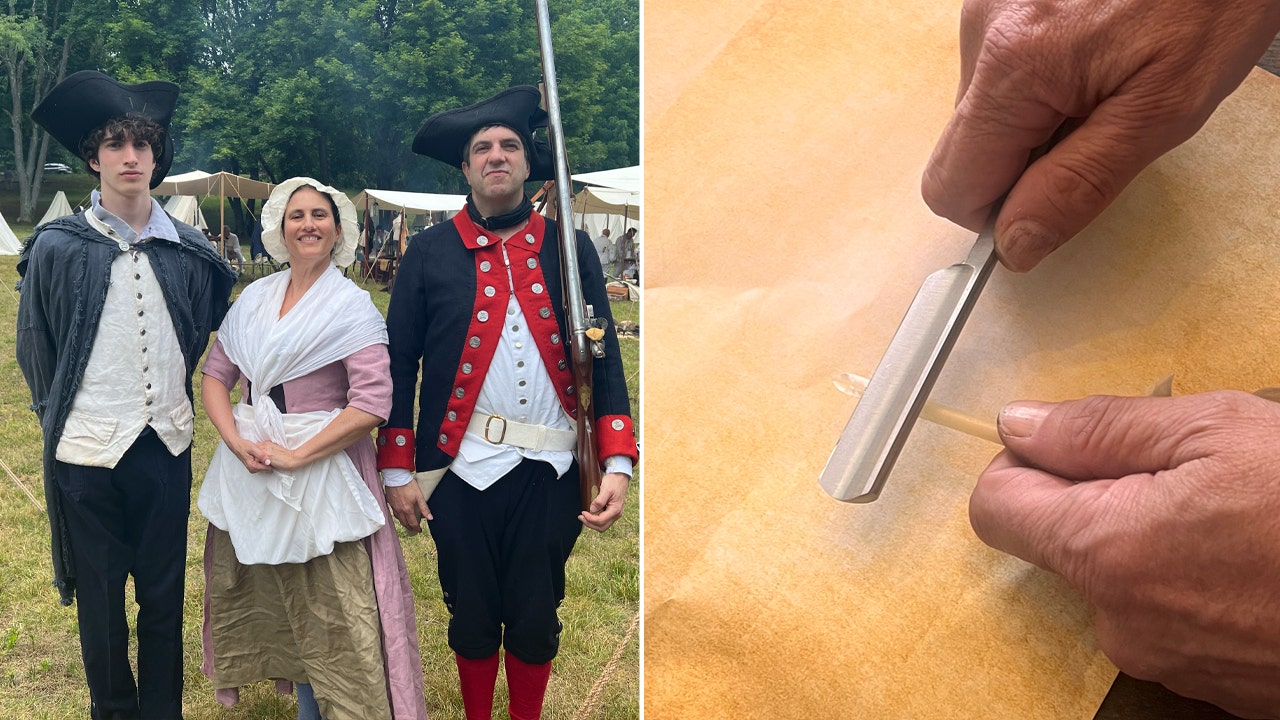Entertainment
Review: Al Pacino memoir 'Sonny Boy' goes all in with swagger, sorrow and why he skipped the '73 Oscars

Book Review
‘Sonny Boy’
By Al Pacino
Penguin, 370 pages, $35
If you buy books linked on our site, The Times may earn a commission from Bookshop.org, whose fees support independent bookstores.
Al Pacino grew up running the streets of the South Bronx with his buddies, getting into whatever trouble might present itself. In his new memoir, “Sonny Boy,” he calls his little crew “a pack of wild, pubescent wolves with sly smiles,” and describes how his three best friends, Cliffy, Bruce and Petey, eventually died of heroin overdoses. Pacino would confine his junkie life to the screen, in his 1971 breakout performance in “The Panic in Needle Park.” He would be the first to tell you that he was saved by art.
Throughout this discursively soulful book runs a series of interconnected questions: Why did I make it when so many others didn’t? Why can’t I just practice my craft and leave the stardom and celebrity part out of it?
Voted most likely to succeed in junior high school, he considered the insignificance: “All it meant was that a lot of people had heard of you. Who wants to be heard of anyway?” And, a bit later: “At a certain point, dealing with fame is a self-centered problem and one should probably keep their mouth shut about it. Here I am talking about it now, so I’m starting to feel I should keep my mouth shut too.” Thankfully, he has too much to say to follow through.
Al Pacino’s new memoir, “Sonny Boy,” delves into his troubled youth, quick ascent onto Hollywood’s A-list and sometimes questionable career choices that followed.
(Penguin Random House)
Now 84, Pacino, who wrote “Sonny Boy” with arts journalist and author Dave Itzkoff, doesn’t really have to worry about offending the person who might get him his next job. He describes creative beefs he had with directors, including Norman Jewison (“And Justice for All”) and Arthur Hiller (“Author! Author!”). A caption accompanying a photo of a hysterical Pacino in “Justice” reads: “I want off this film!”
But kiss-and-tell gossip isn’t really Pacino’s métier. He comes across as a New York theater actor fiercely devoted to the mysteries of the craft, high on the poetry (and, for a long while, booze and drugs), and reluctant to embrace the high profile that followed the star-making success of “The Godfather” in 1972. Never terribly practical, he walked away from movies for a few years in the ’80s — “I began to question the very essence of what I was doing and why I was doing it” — and went broke in 2011, writing, “I had fifty million dollars, and then I had nothing.”
Because he’s now so familiar from so many movie roles, you can almost hear him saying all of this in recognizably Pacino-like tones — the righteous hipster cop of “Serpico” (1973), or the slickly ravenous real estate shark of “Glengarry Glen Ross” (1992). This is part of why we gravitate toward movie stars, even those who would rather be something else. We feel like we know them. Pacino has done such a high volume of great work, including the “Godfather” movies, “Dog Day Afternoon” (1975), “Scarface” (1983), “Sea of Love” (1989), “The Insider” (1999) and “The Irishman” (2019), that reading “Sonny Boy” often feels like hanging out within a history of American movies over the last 50 years.
It can also leave one wanting more about particular favorites. Michael Mann’s “The Insider,” to my mind among the best films of the last half century, receives barely a mention. “Glengarry” gets short shrift as well. Come on, Al. Always Be Closing.
But the eccentricity of “Sonny Boy” is part of its charm, and the book’s distinctive voice speaks to a fruitful collaboration between Pacino and Itzkoff, the first person Pacino thanks in his acknowledgments: “His considerable help and persistence got me to turn corners I never would have turned.”
These pages contain sorrow, for Pacino’s largely absent father and severely depressed mother, for his late boyhood friends, for the poverty and uncertainty that marked his youth. There is also the jolt of discovery, as when a theater troupe came to the 15-year-old Pacino’s favorite movie theater to perform Chekhov’s “The Seagull” and lighted a fire under him. “Chekhov became a friend of mine,” writes Pacino, who was known to wander the New York streets reciting his favorite theatrical monologues at the top of his lungs.
Pondering the fate of his friends who died by the needle, he asks: “Why didn’t I end up that way? Why am I still here? Was it all luck? Was it Chekhov? Was it Shakespeare?” He all but answers the question elsewhere, when he considers the aspiring actors who ask why he made it while they didn’t: “You wanted to. I had to.”
If industry talk is more your thing, Pacino tries to oblige. He writes that he just recently heard a longstanding rumor, that he didn’t attend the Oscars in 1973 because he was nominated for supporting actor rather than lead actor, for “The Godfather.” He offers a much simpler explanation: He was terrified. “It explains a lot of the distance I felt when I came out to Hollywood to visit and work,” he writes. It might also help explain why he didn’t win his first (and only) Oscar until 1993 for “Scent of a Woman,” in which he gave a performance nowhere near his best. (He has been nominated nine times.) He touches on his various Hollywood romances, among them Jill Clayburgh, Tuesday Weld, Diane Keaton and Marthe Keller. Pacino, by his own admission, is an obsessive workaholic, a habit that hasn’t done him many favors away from the screen and stage. He does come across as a devoted father to his three children.
“Theater people are vagabonds, wandering gypsies,” he writes. “We are people on the run.” And for all of his movie stardom, Pacino makes it clear that he is, at heart, a theater person. The two-time Tony Award winner is an artist who happens to have the career of a celebrity. He makes a convincing case for himself as an outsider who crashed the party, driven forward by the work above all. Is this a self-serving portrayal? Perhaps. But most celebrity memoirs are. At least “Sonny Boy” is also shot through with what certainly feels like self-deprecating honesty to go with the well-worn Pacino swagger.

Movie Reviews
Classic Film Review: Damon, Norton, Famke, Turturro and Landau deal the cards — “Rounders” (1998)

The knock on “Rounders” (1998) was always that it was, to quote a review or two at the time of its release, “lazy.”
It’s a genre pic, gamblers’ ups and downs as one (Matt Damon) tries to focus on law school and his law school classmate/girlfriend (Gretchen Mol) and law school mentor (Martin Landau) as his disreputable hustler pal (Edward Norton) drags him back into his favorite vice.
There aren’t a lot of ways for this hand to play out, and director John Dahl (“The Last Seduction,” lots of TV in recent years) and two screenwriters pick the lightest and one could make the case, the lamest.
Damon was young, with a young Hollywood haircut, playing another version of that smart, motormouthed working class knowitall “type” that launched his career in “Good Will Hunting” the year before. So the writers wrote him lots and lots of little “read the player/read the room” monologues, some delivered in the lazy screenwriter’s best friend — voice-over narration.
“I’ve often seen these people, these squares at the table — short-stacked and long odds against them, all their outs gone — one last card in the deck that can help them.
“I used to wonder how they could let themselves get into such bad shape, and how the hell they thought they could turn it around?”
Very Matt Damon speech to make. Very lazy screenwriting to give it to him.
But it’s a GENRE picture. It’s not about the surprises, but the execution, the immersive milieu, the colorful characters. “Rounders” delivers that to perfection. It’s a film that captures a moment in time. And it prefigured the global “Texas Hold’em” poker craze. Hell, even James Bond found himself playing Hold’em and not Bacarat when “Casino Royale” was remade.
I swear I never pass by this film while channel-surfing without stopping to savor Damon, Norton and a long line of colorful supporting players — Chris Messina, Michael Rispoli and Bill Camp before they were famous, Turturro and Oscar winners Damon and Landau, Oscar nominee Norton and future X-woman Famke Janssen.
Damon, a great raconteur and chat show guest (Jimmy Kimmel be damned), has long been telling this hilarious story about working with the odd-accent-slinging John Malkovich, who plays Russian mobster/poker room operator and player Teddy KGB, that’s become a part of the film’s lore.
So there’s a lot to relish in “Rounders,” as it’s become one of those mainstream “cult” films that gets better with age — like “Fight Club.”
The story — Mike McDermott’s a New York law school smarty with a beautiful classmate/live-in girlfriend. He likes to play cards and swim with the sharks, but he keeps that under control for her sake, and to ensure his future.
But when his old running mate Worm (Norton) gets out of prison, Mike finds himself going on a gambling bender to help settle Worm’s gambling debts with Teddy KGB (Malkovich) and the thug called Grama (Rispoli).
Everwhere Mike turns, there’s an old rival/friend (Turturro) who sighs at the lost potential of a player who is great at “reading” the table, the cards and his chief rivals, or a gambling debt collector/barmaid (Janssen) he used to have a thing with. Even the judge (Landau) who is his law school mentor has a “friendly” game of academics and other lawyers that Mike interrupts and “reads” like an old pro.
“You were lookin’ for that third three, but you forgot that Professor Green folded on Fourth Street and now you’re representing that you have it. The DA made his two pair, but he knows they’re no good. Judge Kaplan was trying to squeeze out a diamond flush but he came up short and Mr. Eisen is futilely hoping that his queens are going to stand up. So like I said, the Dean’s bet is $20.”
Worm weasels Mike back into the then-underground world of poker rooms as these “Rounders” — slang for hardcore players — travel from Rahway to Bronxville, Newark to Atlantic City and the bowels of NYC in search of quick cash.
Worm’s a known cheat, but Mike lets him dragshim to the games, winning legit until Worm worms his way onto the same table and starts looking for shortcuts.
That never works out. The movie is about the ballooning nature of Worm’s debt, the beatings and threats to his future Mike endures. Beautiful, rich and about to get richer girlfriend? Law degree?
Norton is in rare, antic form here, showboating about how he doesn’t know Mike when they’ve weaseled into a game with strangers, losing sorely to ensure Mike can win big, taking a bunch of frat boys for a ride, for instance.
“Like my uncle Les used to say “When the money is gone, it’s time to move on”. So enjoy it, you secret handshaking assholes.”
Landau gets to make the big “disappointment to my father” old Jewish judge speech. Mol plays the “It’s me or poker” card as the girlfriend.
“Lazy?” Sure. This movie lays down a straight or a flush, never a straight flush.
But this world is a rare thing, a piece of the “California Split” past before poker and gambling blew-up and ate the early 2000s. We watch gambling movies like that Altman classic and this Dahl classic and “Mississippi Grind” to sample a lifestyle we’d never have the nerve to try. That’s all we really want from this genre.
Hearing Damon recite the script’s poker-professional slang and pro poker player name-dropping might seem “lazy” and heavy-handed. But it’s musical in Damon’s hands. The guy can tell a story.
“Listen, here’s the thing. If you can’t spot the sucker in your first half hour at the table, then you ARE the sucker.”
And there’s no dishonor in critics’ dismissing a film that goes on to become a classic of its genre and a cultural touchstone. Well, maybe a little. But I guess J. Hoberman’s glad to be remembered for something.
Rating: R, violence, drug abuse, profanity
Cast: Matt Damon, Edward Norton, Famke Janssen, Martin Landau, Gretchen Mol, John Turturro, Michael Rispoli, Chris Messina, Bill Camp and John Malkovich
Credits: Directed by John Dahl, scripted by David Levien and Brian Koppelman. A Miramax release on Pluto TV, Amazon, etc.
Running time: 2:01
Movie Reviews
Jigra Movie Review – Gulte

2/5
2 hrs 35 mins | Action Drama | 11-10-2024
Cast – Alia Bhatt, Vedang Raina, Manoj Pahwa, Rahul Ravindran, Vivek Gomber
Director – Vasan Bala
Producer – Karan Johar, Apoorva Mehta, Alia Bhatt, Somen Mishra, Shaheen Bhatt
Banner – Dharma Productions, Eternal Sunshine Productions
Music – Achint Thakkar, Manpreet Singh
Jigra is an action entertainer headlined by Alia Bhatt. This film is also the first film she signed after the birth of her daughter Raha. This action drama has a strong underpinning of a brother-sister relationship, with Alia Bhatt and Archies-fame actor Vedang Raina playing orphan siblings. Jigra is written and directed by Vasan Bala. Vasan was the former assistant of director Anurag Kashyap. He later went on to helm the films Mard Ko Dard Nahi Hota and Monica O My Darling. Vasan has co-written this film with Debashish Irengbam. Jigra is set in the fictional country of Hanshi Dao, which largely resembles Singapore.
What is it about?
Satyabhama (Alia Bhatt) and Ankur (Vedang Raina) are orphans who witness the traumatic suicide of their father as children. As adults, Satya works as a household manager for her wealthy relatives while Ankur studies to become an engineer. When Ankur and his cousin/boss’s son Kabir go to Hanshi Dao to pitch for a tech startup, Kabir gets caught with drugs. In Hanshi Dao, drug offenders are punished with a quick death sentence and there is no leniency offered. Kabir’s family helps him get out of this mess, but they manipulate Ankur into taking the fall. Ankur gets a death sentence in an electric chair and Satya rushes to Hanshi Dao to save her brother. How she saves her brother forms the rest of the story.
Performances
Jigra is Alia’s show all the way. This is also her first full-length action role. Satya is a dark, repressed and somewhat traumatised and violent character, who only wants to protect her brother and make sure he is safe. Alia nails the emotional arc of Satya perfectly and also aces the action sequences, most of which involve hand-to-hand combat.
Manoj Pahwa delivers an endearing and relatable performance as Bhatia, who helps Satya with her plans in Hanshi Dao. Actor and Chi La Sow-fame director Rahul Ravindran makes his Hindi debut with Jigra, playing the role of Muthu, an ex-police officer who wishes to get somebody out from the prison. He plays a jaded yet sensible character with restrained expressions and measured body language. Newcomer Vedang Raina looks great and sings well, but he needs to work a lot on his performance.
Technicalities
The production design of Jigra is loaded with inspired aesthetics and necessary realism. Most of Hanshi Dao has been recreated and shot in Mumbai, and it is commendable how well the recreation is, given the budget and original locations. There are some VFX portions in the film, involving the ocean and the prison, and they look so real that nobody will think it is VFX.
Alia Bhatt’s character Satya is entirely dressed in masculine outfits like oversized shirts, jeans and business suits. Fans who love seeing the actress in more glamorous garb might be disappointed. The music of the film, which includes a recreation of RD Burman’s famous son Ek Hazaaron Mein Meri Behna Hai, hit all the right notes, leaving the audience humming long after the end credits roll.
Thumbs up
Alia Bhatt
Story’s novelty factor
Production Values
Thumbs down
Pacing issues in screenplay
Niche subject
Predictable story
Analysis
Jigra has the 80s-90s template of a traditional, straightforward siblings emotion story. What makes it different is a female protagonist and a foreign backdrop. The story is full of details about Hanshi Dao, and it’s politics and legal system and why Satya must decide to break everything instead of following the rules laid down by the system.
While the emotional factors of the film will keep everyone connected, these Hanshi Dao details may interest some deeply while alienating others. The film is both mainstream and niche at the same time.
Jigra is mostly an events-based film but the problem is we know how the film is going to end so the events become predictable after a point. Instead of taking us only through the events, Jigra should have been more of a character drama.
Vasan Bala is definitely an talented and interesting director and it is good to see his work get mainstream attention. The film (at 2hrs 35 mins) feels a bit too long due to its pacing and some of its creative calls.
This could have been worked around, in order to give a racy, edge-of-the-seat experience to the audience, instead of a mellow, meditative one. In short, Jigra reminds the audience that it is an emotional story and an action story separately but not together.
Verdict – A Fighter With Weak Drama
Rating: 2/5
Related
Tags Jigra
Entertainment
Sum 41 manager Greig Nori denies Sum 41’s Deryck Whibley's sexual coercion allegations

Greig Nori, the former manager for pop punk band Sum 41, has denied the claims in singer Deryck Whibley’s memoir accusing him of sexual coercion and abuse.
“The accusation that I initiated the relationship is false. I did not initiate it. Whibley initiated it, aggressively,” Nori wrote in a statement to the Toronto Star on Thursday.
“When the relationship began Whibley was an adult, as was I,” Nori continued. “The accusation that I pressured Whibley to continue the relationship is false. The accusation that I pressured Whibley to continue the relationship by accusing him of homophobia is false. Ultimately the relationship simply faded out. Consensually. Our business relationship continued.”
Nori did not immediately return requests for comment from The Times.
Nori, now 61, was the singer for the Canadian punk group Treble Charger, a hometown hero to Whibley and host of the MuchMusic reality show “Disband.” Nori later managed Sum 41 as it achieved global success with 2001’s “All Killer No Filler” and 2002’s “Does This Look Infected?”
In Whibley’s new memoir “Walking Disaster,” he alleges Nori groomed and abused him for years, beginning when he was 16 and Nori was 34.
“It all became so clear,” Whibley told The Times in an interview. “Then about a year later, the Me Too thing started happening. I started hearing stories of grooming, and it all started to make sense.”
“He controlled everything in my life, but even the rest of the guys through the band,” Whibley continued. “We were all under his wing. Me more, obviously. But he was such a controlling person.”
After firing Nori in the 2000s, Sum 41 released four more albums between 2007 and 2019, and was nominated for a Grammy in 2012 for hard rock/metal performance. In 2024, he reunited with Sum 41 to release its final LP, the double album “Heaven :x: Hell.”
-
/cdn.vox-cdn.com/uploads/chorus_asset/file/25439572/VRG_TEC_Textless.jpg)
/cdn.vox-cdn.com/uploads/chorus_asset/file/25439572/VRG_TEC_Textless.jpg) Technology1 week ago
Technology1 week agoCharter will offer Peacock for free with some cable subscriptions next year
-

 World1 week ago
World1 week agoUkrainian stronghold Vuhledar falls to Russian offensive after two years of bombardment
-

 World1 week ago
World1 week agoWikiLeaks’ Julian Assange says he pleaded ‘guilty to journalism’ in order to be freed
-

 Technology1 week ago
Technology1 week agoBeware of fraudsters posing as government officials trying to steal your cash
-

 Health7 days ago
Health7 days agoHealth, happiness and helping others are vital parts of free and responsible society, Founding Fathers taught
-

 Sports1 week ago
Sports1 week agoFreddie Freeman says his ankle sprain is worst injury he's ever tried to play through
-

 News7 days ago
News7 days agoLebanon says 50 medics killed in past three days as Israel extends its bombardment
-

 Entertainment3 days ago
Entertainment3 days agoHold my beer can: Museum says a worker thought unique art installation was trash













